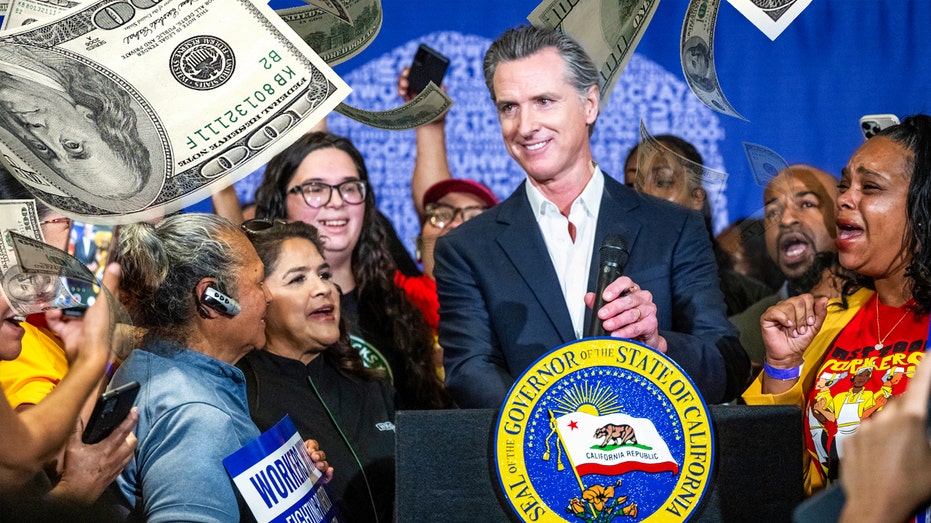Newsom, California business group spar over contrasting job numbers after minimum wage hike
Some California trade groups and fast-food franchisees say the $20 minimum wage for industry workers has harmed their businesses
Sky-high costs in the restaurant sector are ‘only getting worse’: Andrew Gruel
Celebrity chef Andrew Gruel discusses the rising cost of doing business in California as a beloved fast-food chain is forced to close 48 locations throughout the state.
Fast-food jobs have increased in California since the state implemented a $20 minimum wage across the industry despite claims by trade groups that say the hike has hurt franchisees and their employees.
The fast-food industry in California added 10,000 jobs from March through May, according to the U.S. Bureau of Labor Statistics. The new wage went into effect on April 1.
In March, the month prior to the new wage, the state had 735,000 fast-food workers. Since January, nearly 21,000 fast-food jobs were added in California, according to BLS data.
OLIVE GARDEN PARENT CEO SAYS FAST FOOD INFLATION DRIVING CUSTOMERS TO SIT-DOWN FRANCHISES

The Gavin Newsom-approved $20 minimum wage is causing the "collapsing of businesses," say some fast-food owners. Newsom's office cites the addition of fast-food jobs in the two months since the wage hike began. (Getty Images/Fox News Digital/Photo illustration / Fox News)
"The California spirit means working hard and being rewarded with a paycheck that meets your needs," California Gov. Gavin Newsom said. "All our progress on higher wages and better benefits for working people – it’s not just about the hourly pay rate. It’s about building a dignified and respectful future where everyone is included in our growth. We are a state that gives a damn about fast-food workers – who are predominantly women – working two and a half jobs to get by."
Newsom further said "the right wants to strip away protections for working families, we built this economy by valuing the dignity of work, cherishing family time, and honoring labor unions. You shouldn’t have to be a CEO to live a decent life – and in California, you don’t have to be."
The figures compiled by the BLS contrast claims by the California Business and Industrial Alliance (CABIA), which said earlier this month that 10,000 fast-food jobs had been lost. CABIA said the wage hike was responsible for businesses having to cut labor costs to survive.
California minimum wage hikes spell doom for more fast food spots as they lose 'value' factor
Jonathan Maze, editor-in-chief of Restaurant Business, sounds off on the consequences California's minimum wage hike has had on fast food establishments in the Golden State.
The rule impacts restaurants that have at least 60 locations nationwide, except those that make and sell their own bread.
"If I was Gov; Newsom, I wouldn’t be proud of the lowest year-over-year fast-food employment growth we’ve seen in years," CABIA president and founder Tom Manzo told FOX Business. "Barring the pandemic, growth hasn’t been this low since the great recession."
Manzo said the governor was desperate to highlight "a month or two of data that tell a positive story, but the bigger picture is still overwhelmingly negative. He owes fast-food businesses, like the owner of the McDonald’s in San Francisco that just closed, an apology."
CALIFORNIA'S $20 MINIMUM WAGE LED TO FAST-FOOD PRICE HIKES, LOWER CUSTOMER TRAFFIC, STUDY SHOWS

To highlight what it says are the unintended consequences of the new minimum wage law, CABIA has taken out an ad in Thursday's statewide edition of USA Today with mock "obituaries" of popular fast-food brands. ('Fox & Friends' screengrab / Fox News)
Scott Rodrick, owner of the McDonald’s at Stonestown Galleria, just southwest of San Francisco, announced their last day of business was June 23 in a typed note posted on the restaurant’s door.
"The economic headwinds are not just impacting fast-food franchisees, large and small. Most restaurateurs are facing unprecedented challenges – fine dining, casual dining, independent or a brand franchisee like me – this critical California sector is struggling," Rodrick said.
In its most recent annual report, Newport Beach-based Chipotle Mexican Grill reported spending $2.9 billion on food, beverages and packaging last year, up from $2.6 billion in 2022. Labor costs in 2023 were $2.4 billion, but fell to 24.7% of revenue from 25.5% in 2022, the Los Angeles Times reported.
On June 3, Rubio’s Coastal Grill said it had closed 48 of its California restaurants, about one-third of its 134 locations. The chain attributed the closings to the rising cost of doing business in California, according to the Times.
In September 2023, Newsom championed the wage increase when he signed the measure into law. He called it a step closer to fairer wages, and safer and healthier working conditions.
Americans grapple with fast food inflation as 78% now view it as a luxury
California restaurant owner Scott Rodrick discusses the impact of inflation, labor costs and other challenges for the fast food industry on 'Maria Bartiromo's Wall Street.'
GET FOX BUSINESS ON THE GO BY CLICKING HERE
"Because of the leadership of California’s Legislature, these hard workers finally got the raise and job security they deserved. And the companies themselves got a more stable workforce," he said.























